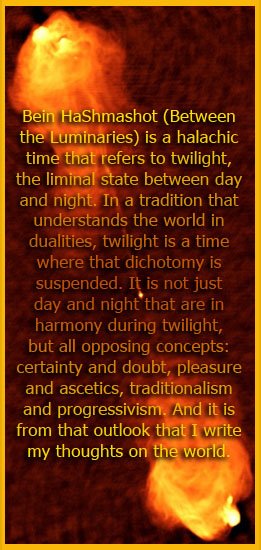Lately I've been reading a lot of Rabbi Nosson Slifkin's blog: Rationalist Judaism. He's the Zoo Rabbi who got put in cherem by the Lithuanian Haredi community for saying such controversial things as "the world is older than 6000 years" and "science has disproven spontaneous generation." But he writes a great blog where he discusses the scientific opinions of Chazal and whether or we should take a literal approach to those views when they contradict modern scientific findings, and he also writes really intelligent critiques of anti-rationalist rabbis.
Here's an email I wrote to him with a rationalistic halachic problem that started to bounce around in my head after reading his blog, along with my not so rationalistic solution:
"Dear Rabbi Slifkin,
I've been subscribing to your blog for a couple weeks now, and hearing your opinion about how Chazal was wrong in their understanding of certain aspects of biology and astronomy raised a question in my head about the halachot related to waking up in the morning.
I was taught that the reason we wash our hands in the morning and say a bracha on awakening and having our souls returned to us was because sleep is so closely related to death that just as you are teuma when you go near a corpse, you are also teuma when you go to sleep. Thus we wash our hands when we wake up just like we wash our hands when we leave a cemetery.
But scientifically, as I understand it, sleep is not at all related to death. No one simply passes away in their sleep. An old person dies in their sleep because of medical complications or organ failure, they don't simply pass away for no reason or because their souls did not return to them. Similarly, when I go to sleep at night, I don't actually believe that I won't wake up the next morning. Of course external forces could cause me to die in my sleep (an intruder, a natural disaster), but nothing in the way I think Chazal traditionally understood it.
Therefore, can the argument be made that Chazal held the worldview similar to other nations that sleep actually was a form of death, and that they were mistaken in that claim? If so, would that have any ramifications for the halachot of awakening such as washing hands or saying birkot hashachar?
Additionally, what would your opinion be on using Hume's Problem of Induction as a solution to this problem? The Problem of Induction states that causality is not explained through reason but actually induction, and that the effect of a cause can only be explained by referring to other occurrences of that effect, which never justify each individual effect. For example: When you drop an egg at a high altitude, you know that that egg will break not because of the elasticity of the shell reacting to gravity and the hardness of the ground, rather you believe it will break because you have seen other eggs break in the past in a similar way. Therefore you cannot actually know that an egg will break before you drop it; it is only after the egg has already broken that you can claim that it broke because of scientific properties - science can only explain the broken egg a posteriori, whereas Hume argues that a priori, reason has no weight on the fragility of that egg.
Applied to waking up in the morning, this modern philosophical problem can give a possible solution to the issue of dying in your sleep. Though modern science would claim that there is no reason you should not wake up the next morning, the Problem of Induction states that just because I woke up the previous day and all days before that does not necessitate that the next day I will wake up. So the brachot still stand because every day I can still thank G-d for waking up in the morning, as one can never empirically know that he will wake up the next day.
What is your opinion on applying the Problem of Induction to Chazal if they were mistaken about the nature of sleep while still subscribing to the halachot that they required? Do you think it's a practical solution or is it misguided? As a self-described rationalist, you probably disagree with the Empiricist school of thought, of which Hume was a proponent, but I am interested in hearing your response since I respect your opinion a lot and I really enjoy reading your thoughts.
Thanks so much,
Eric Salitsky"
UPDATE:
Rabbi Slifkin responded to me with this link (and as I imagined, he was not into the inference solution):
Netilat Yadayim: Ritual of Crisis or Dedication? (PDF)
1.30.2011
Subscribe to:
Comments (Atom)


 RSS Feed (xml)
RSS Feed (xml)